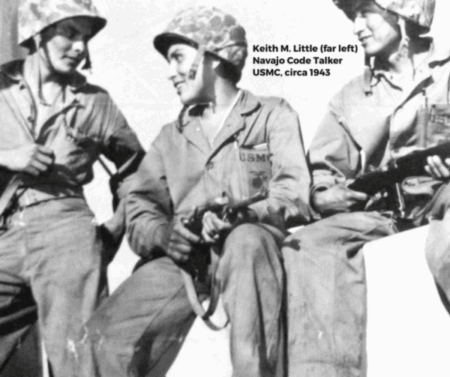
This Memorial Day, the Johns Hopkins Center for Indigenous Health honors the memory of Keith M. Little, a Navajo Code Talker, through the eyes of his granddaughter, Ashley Thacker.

Keith M. Little was one of approximately 400 Indigenous men who used their Native languages to send encrypted messages during World War II, a code that enemy forces could not break. The work of the Code Talkers, including Comanche and Choctaw individuals, was crucial in battles such as Iwo Jima and Guadalcanal. The encoded information was declassified in 1968 revealing the vital role these brave men played in the war.
Little – whom Ashley and her cousins called “Papa” – took great pride in the role he and his fellow Marines played, displaying items related to the work of the Code Talkers all over his home office.
“He was always there sitting at his desk,” tending to duties in his capacity as president of the Code Talker Association and surrounded by memorabilia, including a Navajo Code Talker GI Joe doll and a signed movie poster from “Windtalkers,” released in 2002. “I would go right to his office and give him a kiss on the cheek, and he would always embrace me and say, ‘Hi, my granddaughter.’”
“He was extremely kind and warm, always had a smile on his face,” Ashley continues. “He had so much knowledge, and he was always willing to talk to me, my cousins and my siblings about his years in boarding school and enlisting in the Marines at the age of 17.”
It was always special when “Papa” – born and raised in Tuba City, Ariz. – would sing and play his drum for the assembled grandchildren.
“He had a really unique, deep voice,” Ashley reminisces. “It brings me comfort when I hear his voice in a documentary [about the Code Talkers]. It is one of the things I miss most about him.”
It wasn’t until high school, Ashley says, that she fully grasped the critical role her grandfather and the other Code Talkers played in turning the tide of the war.
Ashley did not attend her grandfather’s funeral in 2012 due to traditional Navajo cultural practices, but family members shared every detail with her. “The Marines came out in their dress blues, and they gave him a full military service,” she says. “My mom and my grandma felt this outpouring of support” from communities all over Diné Bikéyah (land of The People) who claimed Keith M. Little as their own.
“Papa” is buried in the family plot, Ashley concludes tearfully. Despite the tears, “it feels good to remember him and to pay tribute to him. I know he was very proud of what he and his comrades – he always called them his comrades – did.”
“He would tell us how difficult it was when he first returned from the war” and was under orders not to discuss his time in combat. Years later, though, “when he was able to freely talk about it, it brought him so much relief to not have to hide all of that.”
As we honor the memory of Keith M. Little this Memorial Day, we also recognize the enduring legacy of all our Indigenous People’s invaluable military contributions to our nation’s history. Their bravery, dedication, and sacrifices continue to inspire us all, reminding us of the strength and resilience that define our communities.
Ashley Thacker is a Senior Research Program Supervisor for the behavioral health team at Fort Defiance, Arizona on the Navajo Nation.
Learn more about Keith M. Little here.
Article written by: Amy Rogers Nazarov